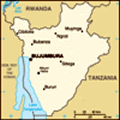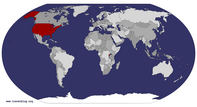Advertisement
Published: June 16th 2011
Hello, hello. I’ve officially been living in Burundi for two weeks, now. Hard to believe! Life in Buja has been pretty great. My research is going well, so far. For better or worse, my questions about violence in the country are becoming increasingly pertinent, which means there’s a lot of information. I’m also learning how to navigate daily life here. I’m not sure what I expected when I came to this country, but I’m pretty sure what I’ve found is not what I anticipated when I got on the plane. Every day, I wonder if my view of Burundi is becoming clearer or more muddled. I wish I knew…
Research Burundi has a relatively tight-knit community of NGOs, consultants, researchers, and academics - everyone seems to know everyone. One person can give you more contacts than you know what to do with, and they all seem more than willing to talk about their work. This is great for me, because I got to hit the ground running. I’m also glad to have Josiah here. We get to come back to the house and bounce ideas off of each other and share information. We do a LOT of this. There’s
just so much to filter through!
The politics of this tiny country are incredibly complex. The current conflict is between the CNDD-FDD and the FNL, formerly the country’s two largest Hutu rebel groups that fought together against Tutsi leadership. Many a Burundian has explained this by saying that politics have shifted from ethnic conflict to political conflict. I still don’t know what that really explains.
Burundi has largely been at peace since 2005, but that changed with the 2010 election. First, there’s the issue of government corruption. Rampant. There’s been talk of budget ‘mismanagement’ and intimidation of opposition party members. When the CNDD-FDD won the elections in a landslide, the FNL accused them of stealing votes. Somewhere in the middle, the violence began – specifically between elite members of the two parties. Neither party seems willing to negotiate, though each party blames the other for this.
So far, no one I’ve talked to foresaw the escalation of this violence over the last month. The attacks have increased quite suddenly and become more common in rural areas. The government has announced that it will all be over by the end of July … so it’s a very strange
time to be here. I swear I didn’t plan it this way. Most of this wasn’t happening when I bought the plane ticket. And, don’t worry – I am safe, where I live.
The People on the Bus Go… Squish Squish Squish? Aside from my research and the great camera debacle of 2011, life in Burundi has been a wonderful adventure. Buja is hot and dusty – be prepared to sweat, if you come here. And be prepared to walk. Whenever someone says that a building is “just over there,” or “in that direction,” I’ve learned it is much, much farther away than I expect it to be. In my first week here, I figured out the buses and the market – I learned a lot of Kirundi words to use at each, and took Bwegu (the dog that lives with us) on a walk. Watching everyone’s reaction to a couple of foreigners walking a dog was pretty amusing – most of them are afraid of the dog. In the second week, I got permission from the government to conduct my research, which made me feel very official. And, I visited one of the neighborhoods I’ll be sampling

 Ferocious
Ferocious
I love that all the Burundians are afraid of him. I never have to worry for my safety... nothing will get past Bwegu.in my research. I also went swimming in the lake and tried Indian food here, at Tandoor restaurant (so delicious, but not cheap).
My first day, I went up to a couple of girls and tried to ask where the bus stop was in French, only to forget the French word for “bus.” By the way, it’s “bus.” Seriously. The bus is cheap – about 320 FBu for a ride, which is the US equivalent of about 25 cents. And, if you’ve read the lonely planet guide to Burundi, you can throw out the part where they say that there are bus signs in the city center labeling the destination of each bus. Apparently, those signs were destroyed a long time ago.
I spent 20 minutes looking for a bus that traveled past my house. From bus to bus to bus, my favorite phrase became Ndashaka kuja Kigobe-Sud kukiraro (I want to go to Kigobe-Sud near the bridge). Using this phrase makes people laugh – everyone thinks it’s hilarious to see a ‘muzungu’ braving the chaos of the bus station, trying to use Kirundi. The bus ‘station’ is hot and crowded, and filled with the exhaust fumes, but

 The Bus Station
The Bus Station
Audifax was leading the way to the correct bus - he used to work here, so he knows his way around pretty well.it’s fairly easy to navigate once you’ve done it a couple of times. Josiah and I are the only muzungus I’ve seen there, so far. I suspect most prefer to avoid the acute feeling of claustrophobia you get when you’re sardined into a 20 passenger van so tightly that you can’t even properly get the money out of your bag to pay the driver. By the way, Kirundi isn’t necessary; you can also speak French to most people easily, provided you don’t forget the word for ‘bus.’ I know what you’re thinking: Is ‘sardined’ a verb? It is now.
Muzungu… but I’m not white? I often get asked whether I’m considered a ‘muzungu’ when I’m here. Yes, everyone calls me muzungu. Kids and adults alike – they love to yell it as I walk through the neighborhood. One of the girls in the neighborhood came by the other day, unannounced, to ‘show’ me to her friend. I was in pajamas, and I was less than pleased. I felt like an animal in the circus. Yeesh. Oh well, it happens. Most of the time, it doesn’t bother me at all.
But, I have the added benefit of watching
people try to make sense of the fact that I’m not a
white muzungu. And, I’m not black... so very confusing. “You’re black… but you are mixed?” Indeed.
On Monday, Josiah introduced me to one of the men he worked with for his research. All of the sudden his eyes got really wide and he said to Josiah, “Ah… and she’s a Negro American! Ah!” I love those moments when no one knows quite how to respond. The fantastic awkwardness had nothing to do with his intentions… just… seriously, how do you respond? “Yes, yes I am.”
Of course, my favorite comment about my appearance had nothing to do with race or nationality. I was looking for a man who worked with several organizations in Burundi, whom I’d met through a networking site. I waited for a bit, then decided to give him a call. He was already there, “OH! I’m so sorry I didn’t recognize you. In your photos online, you are slimmer.” What? Didn’t recognize me? Just how much weight does one have to gain to be unrecognizable from their photos?
Escaping Yesterday, Josiah and I successfully cooked a southern meal that would make
my South Carolina friends proud: steak, mashed potatoes, gravy, and green beans cooked with shallots, rosemary, and some butter and lemon. And we had some toasted bread on the side. And when it all turned out perfectly, you should have seen the smiles on our faces! I have never eaten so much rice and beans in my life as I have here – every day, for lunch and dinner. It tastes great, but it’s a LOT of rice and beans. We were so excited to eat something that made us feel at home.
While here, I’m beginning to understand the value of having little ways to ‘escape’ every once in a while. Burundi has the lowest (or second lowest) GDP per capita in the world. In our talks, Josiah repeats this word: desperation. Yesterday, he got ambushed – two children hung on his arms while another wrapped his entire body around his leg.
What the hell--where did that come from? I quickly gave money to the kids, so that we could leave. Everyone knows you have more money than they have – and you are never allowed to forget it. Here, that makes you an opportunity to be exploited.

 Every. Day.
Every. Day.
Tasty and consistent. Josiah sometimes wonders if he would be any different if he were born here, into this kind of poverty. It’s hard to know, isn’t it?
Being privileged in a society where the average GDP is around $300/year is just about the best problem you could ask for. However, that doesn’t make the experience any less exhausting. There’s a freedom that comes from being anonymous – from feeling like you’re at home – and that’s what you regain when you hang out at a coffee shop, or step onto the beach… or make yourself some damn tasty steak, potatoes, and green beans.
This is certainly not true all the time. Overall, people are extremely nice in Burundi. Most of my days are spent walking around Buja feeling completely safe, and I come home after having a really productive day. There’s nothing wrong with asking for directions if you’re lost, and I’m more often pleasantly surprised by people than disappointed. Even the guy who said I was fatter than my pictures was AMAZING to interview. I was so excited after meeting him – this place can be as energizing as it is exhausting. And, I cannot wait to start working

 Nthangwa River
Nthangwa River
One day, I decided to walk across the street from our house and see what was there. This.in the neighborhoods I’ve picked for research. I feel like a child on the first day of school (
I hope they like me! I hope I can make friends…). So, in conclusion, I have only more muddled thoughts to share – not that that’s a bad thing.
Until next time!
Advertisement
Tot: 0.209s; Tpl: 0.013s; cc: 9; qc: 57; dbt: 0.0568s; 1; m:domysql w:travelblog (10.17.0.13); sld: 1;
; mem: 1.2mb


















Celeste Gray
non-member comment
You look plenty slim, haha. This was a good read. Good luck in your continuing research!